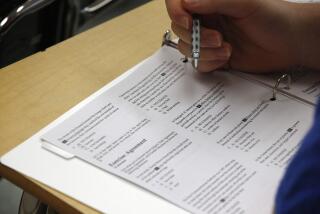How will students take AP tests with schools closed? At home, College Board proposes
- Share via
Aiming to limit student exposure to the coronavirus, the College Board is proposing that rigorous Advanced Placement tests could become take-home exams and has canceled the SAT test scheduled for May 2.
ACT Inc. has postponed its April 4 exam to June 13.
The AP exams, which test students on prescribed college-level curriculum across subjects, including calculus, history and English, remain scheduled for May 4–8 and 11–15, with late testing scheduled for May 20–22. College admissions officers regard AP courses as important markers of a student’s academic ambition and readiness for college work. Students who pass the AP exam may receive college credit, depending on the campus and test score.
“The AP Program is finalizing streamlined AP Exam options that would allow students to test at home, depending on the situation in May,” the College Board said in a statement. “We’re working to give every AP student the opportunity to claim the college credit they’ve earned.”
Some AP teachers, however, said they feared that at-home tests could result in widespread cheating. They also questioned whether all students would have equal access to home computers, WiFi and data plans needed for at-home testing.
Gov. Gavin Newsom said Tuesday, however, that it was “unlikely” that many schools, if any, would open before the summer break. He said teachers and staff “shouldn’t worry about coming back” to administer SAT, ACT and AP tests.
A College Board official was not immediately available for comment but the nonprofit said in statement that it would release further details about AP testing opportunities on Friday.
Monty Armstrong, an AP World History teacher at Cerritos High School, said the move to at-home testing could be a “disaster.”
“There’s no real way to monitor the student,” said Armstrong, who is a co-moderator of the College Board’s AP World History teaching community.
Armstrong said tests should continue to be administered at schools, with students spaced six feet apart as recommended by guidelines on social distancing by the Centers for Disease Control and Prevention. Cerritos High School has been giving AP tests that way in the gymnasium for about the past five years with no problems, Armstrong said. He added that students could be given individual times to check in to avoid large groups converging at once.
Miles Nagaoka, who teaches AP English Language and Composition at Lincoln High School, also said he was concerned about the potential for cheating and equal access to technology. But one potential upside, he said, is that the College Board could administer an online test at the same time across the country, preventing students in different time zones from sharing information as some reportedly have in the past.
But Eddie Comeaux, who heads the University of California’s Academic Senate committee overseeing testing and admissions policies, said he would not personally be opposed to at-home tests. At UC Riverside, he teaches several online classes, including one about policy and legal issues in intercollegiate athletics. He said he is able to secure the integrity of online exams using a third-party proctoring platform, ProctorU.
Under the setup, a proctor watches the student take the test via computer after confirming the ID. The proctor is able to see everything on the student’s desk, he said, and would be able to see any use of prohibited items, such as phones, notes or books.
“In my five years using this, I have never heard of any compromising of the integrity of the exam,” Comeaux said. “I think it’s great. It works.”
The College Board has not yet canceled the SAT test scheduled for June 6.
“The College Board will provide future additional SAT testing opportunities for students as soon as feasible in place of canceled administrations,” the nonprofit said in a statement. “We’ll be as flexible as possible to give students the best chance to show their skills and stay on the path to college.”
More to Read
Sign up for Essential California
The most important California stories and recommendations in your inbox every morning.
You may occasionally receive promotional content from the Los Angeles Times.











